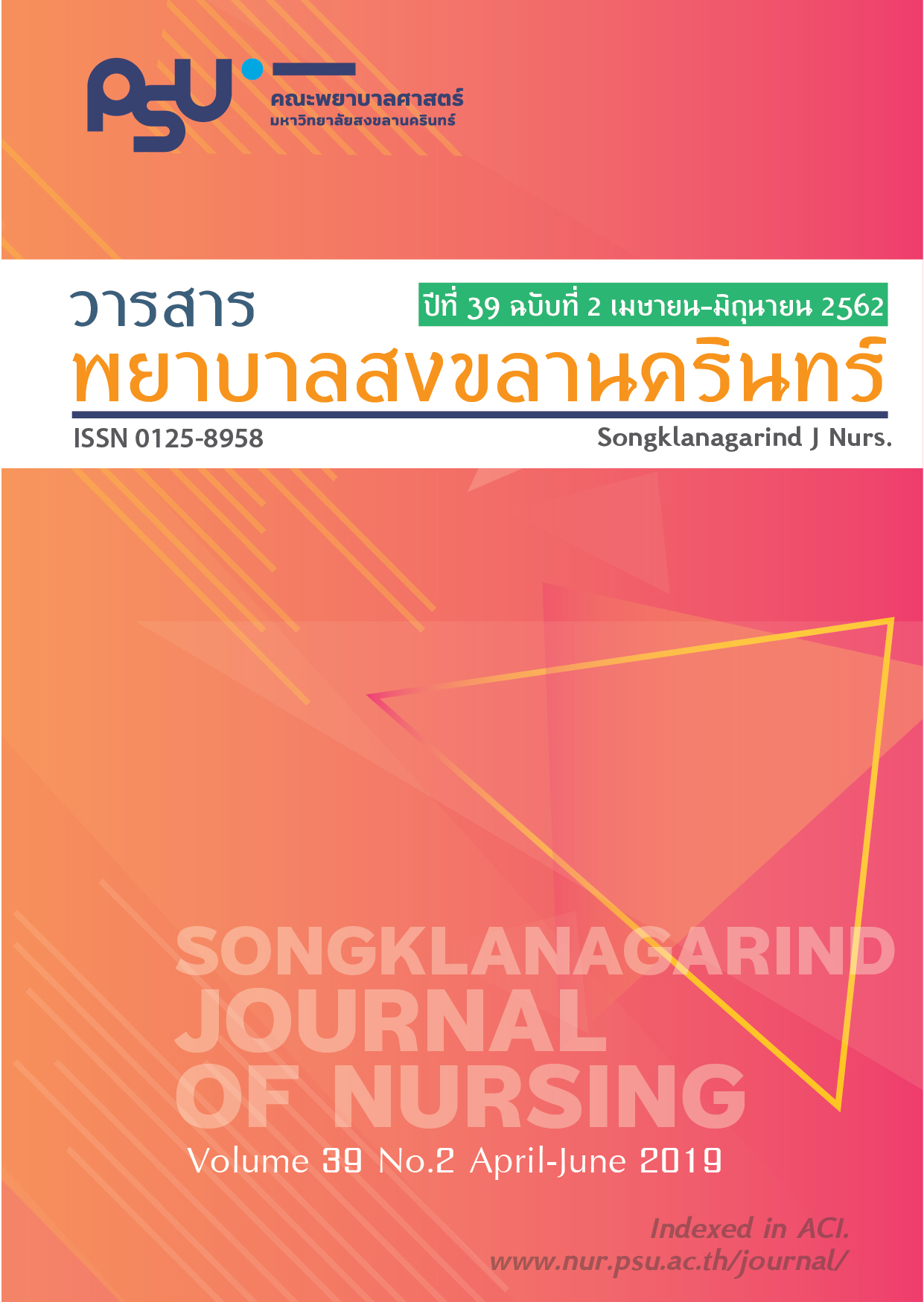The Effects of Problem-Based Learning on Critical Thinking Among Baccalaureate Nursing Students
Main Article Content
Abstract
The purpose of this quasi-experimental study was to examine the effects of Problem-Based Learning on critical thinking among nursing students. Participants included 142 fourth-year undergraduate nursing students, who were enrolling in the “community health nursing II” course at one of nursing colleges of Praboromarajchanok Institute for Health Workplace Development. The instruments included the 7 steps of Problem-Based Learning and the critical thinking test, which was used for collecting data before the intervention and 1 month after the intervention. Descriptive statistics and the Wilcoxon Signed Ranks Test were used to analyze data. The purpose of this quasi-experimental study was to examine the effects of Problem-Based Learning on critical thinking among nursing students. Participants included 142 fourth-year undergraduate nursing students, who were enrolling in the “community health nursing II” course at one of nursing colleges of Praboromarajchanok Institute for Health Workplace Development. The instruments included the 7 steps of Problem-Based Learning and the critical thinking test, which was used for collecting data before the intervention and 1 month after the intervention. Descriptive statistics and the Wilcoxon Signed Ranks Test were used to analyze data.
The results showed the mean of overall critical thinking scores after the intervention was significantly higher than those of before the intervention (p< .05). The mean of inference subscale score after the intervention was significantly higher than those of before the intervention (p< .05). Findings indicated that Problem-Based Learning is an effective approach to enhance critical thinking of nursing students. Therefore, schools of health professional can utilize the PBL in variety of subjects of nursing field in order to improve critical thinking skill of 21th century learning and life-long learning of the students.
Article Details
References
Tayyeb R. Effectiveness of problem based learning as an instructional tool for acquisition of content knowledge and promotion of critical thinking among medical students. J Coll Physicians Surg Pak. 2013; 23(1): 42-6. doi: 01.2013/JCPSP. 4246.
McMahon MA, Christopher KA. Case study method and problem-based learning: Utilizing the pedagogical model of progressive complexity in nursing education. Int J Nurs Educ Scholarsh. 2011; 8(1): 1-16. doi: 10.2202/1548-923X.2275.
Ministry of Education. The 21st century learning. [internet] . 2016 [cited 2016 Jun 12]. Available from: http://www.moe.go.th/moe/th/news/detail.php?NewsID=38880&Key=news_research. Thai.
Ritchie G, Smith C. Critical thinking in community nursing: Is this the 7th C? Br J Community Nurs. 2015; 20(12): 578-9. doi: 10.12968/bjcn.2015.20.12.578.
Ar-yuwat A. Problem-Based Learning (PBL): The challenges of nursing education to foster intellectual skills in the 21st century. Nurs J Ministry of Public Health. 2017; 27(2): 15-30. Thai.
Hamdan AR, Kwan CL, Khan, et al. Implementation of problem based learning among nursing students. Int Educ Stud. 2014; 7(7): 136-42. doi: 10.5539/ies.v7n7p136
Oldenburg NL, Hung W-C. Problem solving strategies used by RN-to-BSN students in an online problem-based learning course. J Nurs Educ. 2010; 49(4): 219-22. doi: 10.3928/01484834-20091118-01.
Wanichpunchaphol W. Critical thinking for nurses. J Nurs Division. 2010; 37(3): 131-40. Thai.
Magnussen L, Ishida D, Itano J. The impact of the use of inquiry-based learning as a teaching methodology on the development of critical thinking. J Nurs Educ. 2000; 39(8): 360-4.
Ericksen K. The importance of critical thinking skills in nursing. 2017 [cited 2018 Oct 25]. Available from: https://www.rasmussen.edu/degrees/nursing/blog/understanding-why-nurses-need-critical-thinking-skills/
Panettieri RC. Can critical-thinking skills be taught? Radiol Technol. 2015; 86(6): 686-8.
Moradi T, Taghadosi M. The effect of problem-based learning clinical education on nursing student’s critical thinking. Future Med Educ J. 2016; 6(3): 20-2. doi: 10.22038/fmej.2016.7970
Penjvini S, Sirioos Shahsawari S. Comparing problem based learning with lecture based learning on medicine giving skill to newborn in nursing students. J Nurs Educ Pract. 2013; 3(9): 53-9. doi: 10.5430/jnep.v3n9p53
Chaiya S. Effects of clinical teaching by using portfolio on critical thinking ability and self directed learning readiness of nursing students. [Thesis], Faculty of Nursing. Chulalongkorn University. 1998. 1-146. Thai.
Pattiyatani S, Chatsuwan J, Kamdee W. Critical thinking test. JEM-MSU. 2005; 11: 1-15. Thai.
Arpanantikul M, Luecha Y. Problem-based learning: Undergraduate Thai nursing students’ perceptions. Pacific Rim Int J Nurs Res. 2010; 14(3): 262-76.
Kong L-N, Qin B, Zhou Y, et al. The effectiveness of problem-based learning on development of nursing students’ critical thinking: A systematic review and meta-analysis. Int J Nurs Stud. 2014; 51(3): 458-69. doi: 10.1016/j.ijnurstu.2013.06.009
Kowalczyk N. Review of teaching methods and critical thinking skills. Radiol Technol. 2011; 83(2): 120-32.
Srisawad K, Rattana-olarn T, Kiddee K. Factor analysis of critical thinking among nursing students from private higher education institutions. J Health Res. 2016; 30(5): 363-9.
Yu D, Zhang Y, Xu Y, et al. Improvement in critical thinking dispositions of undergraduate nursing students through problem-based learning: A crossover-experimental study. J Nurs Educ. 2013; 52(10): 574–81. doi: 10.3928/01484834-20130924-02.
El-Raouf SEA. Nursing students’ experiences with problem based learning: A teaching strategy applied in community health course. Med J Cairo Univ. 2011; 79(1): 323–33.
Yuan H, Kunaviktikul W, Klunklin A, et al. Improvement of nursing students’ critical thinking skills through problem-based learning in the people’s republic of China: A quasi-experimental study. Nurs Health Sci. 2008; 10(1): 70-6. doi: 10.1111/j.1442-2018.2007.00373.x.
Gholami M, Moghadam PK, Mohammadipoor F, et al. Comparing the effects of problem-based learning and the traditional lecture method on critical thinking skills and metacognitive awareness in nursing students in a critical care nursing course. Nurse Educ Today. 2016; 45: 16-21. doi: 10.1016/j.nedt.2016.06.007.


